There’s a thrill to being a kid and playing cops and robbers. It’s black and white, good and bad, law and chaos. The game rarely has subtlety on the surface. Sure, many kids do add nuance. Sometimes, your cop has a chip on his shoulder. Sometimes, your robber is doing it because of a noble reason. It’s a game played because it’s fun to be on a team with a clear goal in mind. It’s, more often than not, boys pretending to be men, working together. Men that are the pinnacle. That even if the robbers rob for greed, they still get one over on “the man” and even if the cops don’t go by the book, they still get justice in the end. It’s often we see men in these roles on film. Men that fit the archetypes we’ve come to know. There’s no better writer and director better than Michael Mann when it comes to the crime genre.
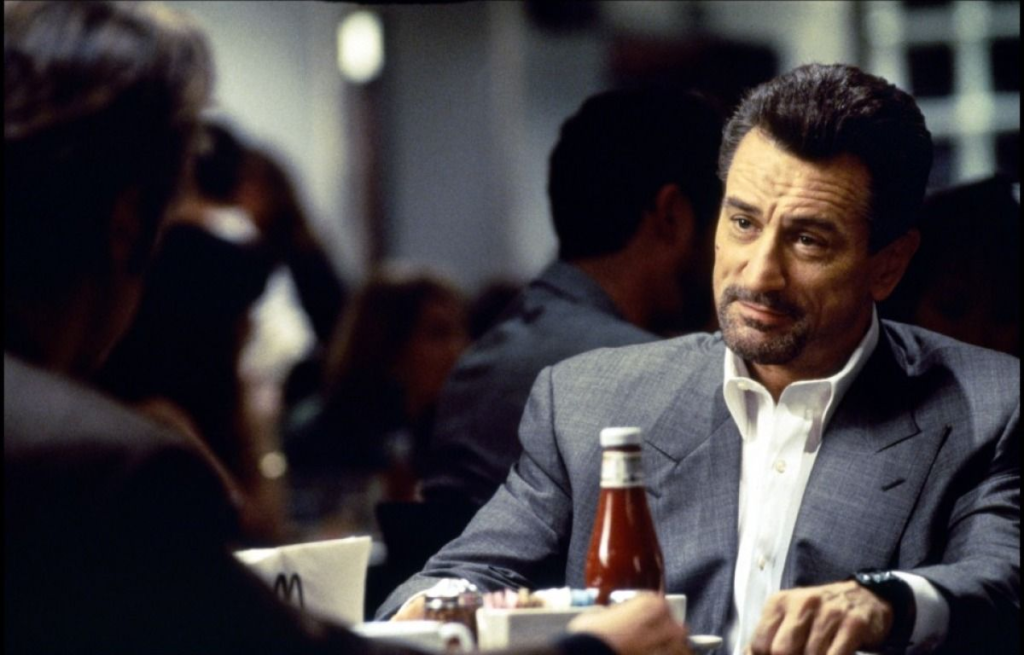
As a director and screenwriter, Michael Mann has forever changed the nature of the crime movie. There are others who go their own way, but it’s obvious the tremendous impact Mann has had on the genre over the last 40 years. What the imitators never quite latch onto is the intrinsic and subtle masculinity to Mann’s men. It’s not full of toxicity, overconfidence, ignorance, or sexual dominance. It’s not about comparing the size of… case files with fellow officers, making empty threats to mobsters, or exhibiting hostility because they don’t understand how to express their feelings. Their masculinity is confident, compassionate, protective, and vulnerable. Michael Mann’s cops and robbers are elevated beyond their archetypes because of this ethos and it’s never more present than in his magnum opus, Heat.
So much of Heat relies on the incredible characters within, buttressed by immaculate robber Neil McCauley (Robert De Niro) and ultra-capable cop Vincent Hanna (Al Pacino). Yet, this original vision couldn’t have happened as well as it did if Michael Mann hadn’t cut his teeth on two adaptations first. With Thief, based on the novel “The Home Invaders” by Frank Hohimer; Mann films his version of the noble safecracker who dreams of a simple life to live after one more big score. For Manhunter, based on the novel “Red Dragon” by Thomas Harris; Mann films an investigator who can’t let more innocence be tainted by another psychopath. The two sides of the spinning coin that is Heat were informed by Mann’s work on the men in these two films. He found his role models within these masculine ideals.

In Thief, there is a real man behind the swagger. Frank (James Caan) picks his jobs carefully. He limits risk to himself and his crew because he has a plan. He spent the majority of his life in prison and he isn’t going back, but he has no skills, except what was taught to him by his mentor, Okla (Willie Nelson). In four short years of freedom, Frank has amassed a modest fiefdom to launder the money from his heists. He rules over a used car lot and a small bar, coming and going from each as he makes sure his true line of work runs smoothly. Of course, peace can never last and Frank’s little fiefdom soon abuts a mighty kingdom, the kingdom of Leo (Robert Prosky), the biggest fence in Chicago. Leo offers the quickest path toward Frank’s way out; big scores, high yield investments, access to worlds he couldn’t even come near working his quick, small jobs. Like all greedy people who want to exploit someone more skilled than they are, Leo doesn’t pay Frank what he owes. Leo keeps Frank, yokes him, and tells him he’s going to do more, steal more, give up more. Frank soon finds a way to toss said yoke from his shoulders and become his own boss again, though it leaves him alone and drenched in blood.
It seems simple when it’s put this way, but the nuance Michael Mann brings out of the character, aided of course by James Caan’s superior performance, elevates Thief beyond its surface. Frank’s dream is simple: make enough money to support a family comfortably and live out the rest of his days as a private citizen. He carries around in his wallet a sort of innocent and childish collage he’s made of houses, women, children, and Okla, the man who let him dream. It’s private, but he eventually lets Jessie (Tuesday Weld) in on the plan. It takes some convincing as Frank unintentionally stands Jessie up for their date when he goes to retrieve money taken from him by Leo’s associates.
In a move that seems too aggressive and a notch against Frank, he pulls Jessie out of the bar she’s in and into his car. They shout at each other, Jessie more than Frank, but there’s a beat when Frank turns and his anger becomes bemusement. Not antagonistic, natural and vulnerable care, which softens Jessie quite a bit. The two of them end up in a late night coffee shop, but there’s still animosity coming from Jessie, so Frank lays it all out for her. He pours out his soul as the two of them get to know each other. Suddenly his scars, his limp, it all makes sense in the broader picture of why Frank is so guarded and so untrusting of most other people. Though, he always has in the back of his mind Okla’s sage advice, “Lie to no one. If there’s somebody close to you, you’ll ruin it with a lie.” In the emotional peak of the scene, as Jessie tries to give Frank one more out telling him she can’t have children, he shouts that they’ll adopt. Frank is all in. He is more than ready to “get on with this big romance.”
It’s so rare to find masculine vulnerability like this on film. So many men on screen who are tough don’t ever delve this deeply into themselves to try and make someone else understand them. So often they fail in the fundamentals of humanity in order to maintain a persona and to erase this kind of vulnerability. A character like Frank proves he can be a swaggering, confident, masculine man, but one who understands that in order for someone else to want to be with him, he has to let them in, let them see the real him.
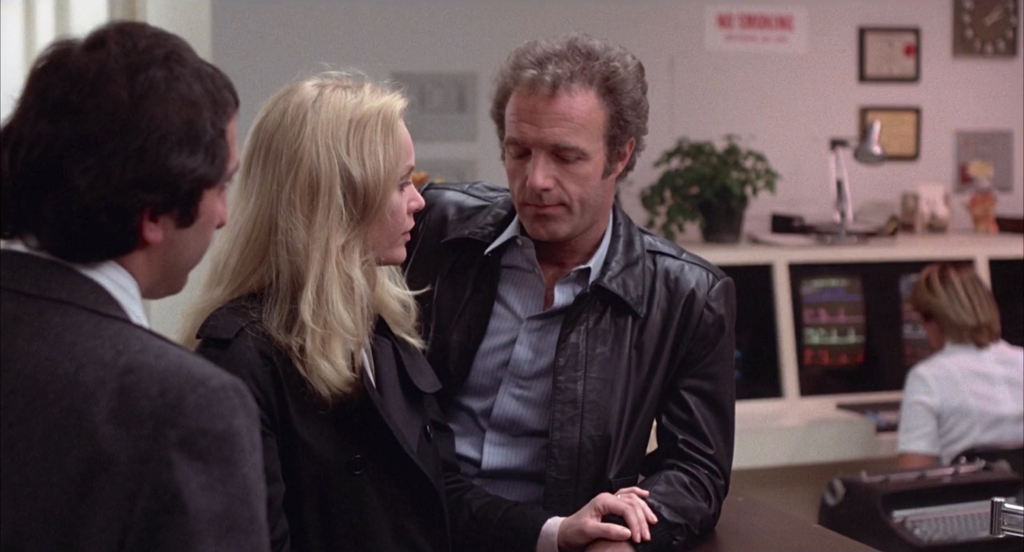
It’s in a scene that follows that we see the right kind of masculine anger. When Jessie and Frank sit down with the adoption agent, Mrs. Knowles (Marge Kotlisky), she backs Frank into a corner because she doesn’t understand that the first line of his resume means he was a prisoner for the long stretch of years listed there. When he finally lets her in on it, the conversation immediately shuts down. His shouts and anger aren’t at the woman, but at the system she represents. It’s a system that will never allow a person like him, even with his stable income from legitimate businesses and his loving relationship, to adopt a child the legal way. In this tirade he plays his last card. He tells everyone in the office that he was a child in this system, he was “state raised.” Frank knows what these children face and what’s waiting for them on the outside. He can change a kid’s life, but because of who he’s been, he isn’t allowed to.
It’s this frustration that pulls Frank closer to Jessie. The two of them, in a scene without dialogue, sit in front of the fire, Frank cuddling into Jessie. She comforts him in his hour of need and makes him feel safe. This need for comfort isn’t weakness or a character flaw, but a self awareness that many men lack because of the toxicity of our society’s flawed masculine ideal. Frank is still adept, strong, smart, and just the right amount of aggressive. He doesn’t become soft because of Jessie, he allows himself to be open to a person who accepts him, which gives him strength in the conflict to come. That’s when Frank takes care of his budding family in the only way he knows how.

In Manhunter, a man is consumed by the thing he does best. Will Graham’s (William Peterson) talent for diving deeply into the minds of psychopaths chips away at his own being, leaving his mind disturbed by the scenarios he replays. Will is a former cop dragged back into profiling by his friend and former boss FBI agent, Jack Crawford (Dennis Farina). Will walks the recent crime scenes of a serial killer the media has dubbed the Tooth Fairy, but who the FBI finds out prefers the moniker Red Dragon (Tom Noonan). Will thinks of things the investigating officers didn’t because he has the pattern between both cases of horrendous murder. He pieces it slowly, but there’s something that nags at him, an opinion he doesn’t want, but needs, and he goes to the one man, the man who tried to disembowel him, Dr. Hannibal Lecktor (Brian Cox). Will opens a door with Lecktor that eventually leads to the Red Dragon, but it claims the life of a tabloid reporter, compromises his family’s safety, and makes him question his own judgment along the way. Stumbling on the key piece of evidence, Will and the full force of a police apparatus at his back charge in and stop Red Dragon from further mayhem, saving the latest would be victim from further harm.
It’s a classic police thriller. Cops win, bad guys lose. Yet, Will isn’t the typical cop and I’m not just referring to his potential. He has a strange empathy toward psychopaths that allows him to get inside their methods and motivations. Though, Will isn’t territorial about his investigations even if he insists on visiting crime scenes alone. So many cops in film are brash, “I know everything, you know nothing,” types. They claim ownership of things pertaining to the cathey work, they shut people out, try and get to something first, but Will isn’t like that. Will wants, above everything, above all the pettiness of jurisdiction and field authority, to stop a murderer from murdering by all the means at his disposal. Will has an ego, but he knows when it’s necessary to deploy it and when it must be tamped down to achieve his goal.
In this sense, he also knows that in order to find a demon he has to go to the devil for help. Will isn’t just nervous because he put Lecktor away, but because unlike the other criminals he’s helped to capture, Lecktor got close to Will. Lecktor stabbed into and then dragged his blade across Will’s abdomen. He didn’t just want to kill Will, he wanted Will to feel what it was like to die knowing how helpless he is. Yet, Will knows that Lecktor is the only person who could get into the head of the Red Dragon better than he can. He sits and he takes the needling, Lecktor’s attempts to psychologically get under his skin. It isn’t until Will runs out of the building that he lets his panic attack fully envelop him. Even in the panic, though, Will finds that Lecktor is more than a mere useful tool.
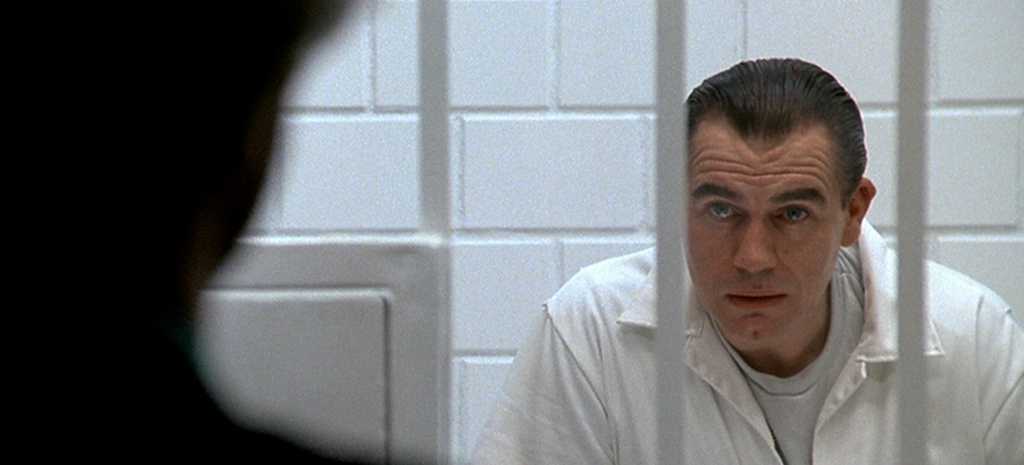
In a strange scene that’s far more comfortable in a teenage rom com, Will and Lecktor share a late night heart to heart. Lecktor in full comfort is laying on his bed with his feet propped on the concrete wall of his cell, his left arm draped over his forehead, bracing the receiver to his ear with his bicep and his right resting on his abdomen. Will is in a hotel room, smoking a cigarette, barefoot and, while he starts the conversation with animosity, he settles into it as he gets more interested. He drapes one of his legs over the arm of the chair he sits in and drinks in what Lecktor is philosophizing. It plays as two people who are intimate with each other. Even as the wheels in Will’s mind turn because Lecktor has, as he always does, told Will exactly what he needs to hear in the moment, Will still has an appreciative look as he pulls the phone away from his ear. It’s a scene that doesn’t need to take place as it does, but it conveys the intimacy of these two men. That in spite of their animosity, they crave understanding. They want for the other to see them the way they need to be seen. This is a hard thing for two men to do because of what is expected of men and how outsiders might view this kind of male intimacy.
It’s a scene that lends itself perfectly to the one in which Will and Kevin (David Seaman), his stepson, have a heart to heart. After boorish tabloid reporter, Freddie Lounds (Stephen Lang), publishes photos and an exposé detailing Will’s first visit to Lecktor, as well as deep background on Will, Kevin seems distant toward Will. Unlike many dads in his shoes, Will decides to meet the awkwardness between the two of them head on. He takes Kevin shopping and he lays it out for him. Kevin’s very understanding and they hug. This is very hard for Will or any father to do because fathers are a monolith in our society. They have to be strength incarnate, a bulwark against all forces coming for their family. Yet, dads have struggles, too. The more they speak to others about those times when they lack strength to go it alone, the better. Will understands that when he married Molly (Kim Greist) he took on more than a responsibility to protect, but also to seek comfort in people who love him. He doesn’t lay his burdens on them, but he doesn’t retreat into himself either. He has balance with them and he owes them a palatable version of the truth he sees everyday.
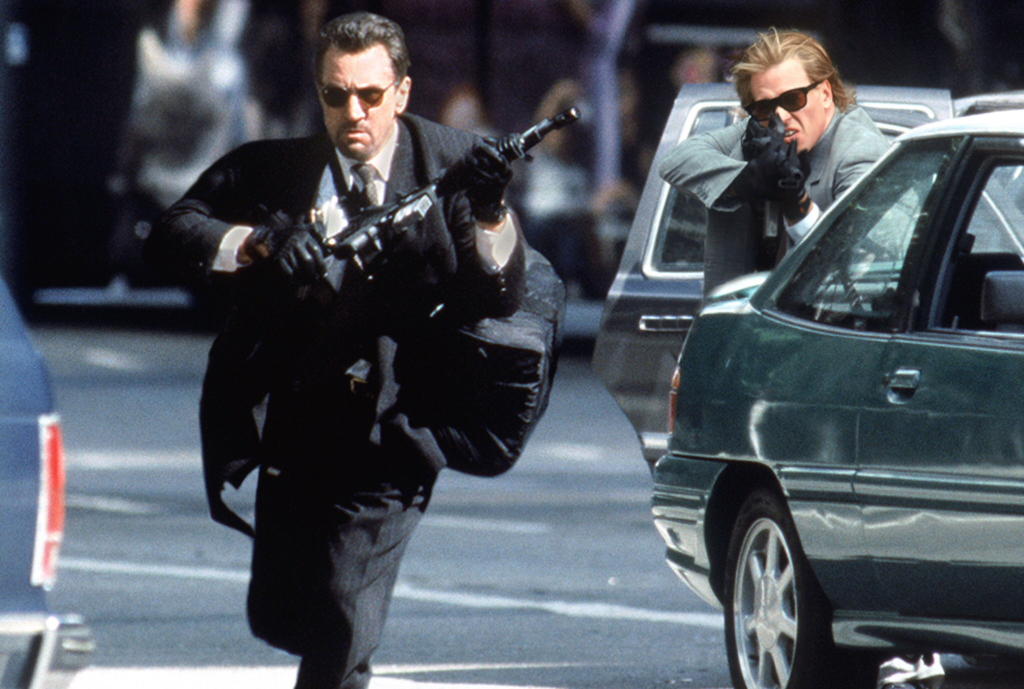
The lessons Michael Mann learned in adapting these previous works helped him shape his singular epic, Heat. There are several comparable aspects between Mann’s original work and his two adaptations. Like Frank in Thief, Neil McCauley falls for a woman, head over heels. Like Will in Manhunter, Vincent Hanna has entered a relationship where he’s a stepfather. Neil gets involved with a businessman, Van Zant (William Fichtner), who tries to get one over on him. Vincent comforts a grieving mother (Hazelle Goodman) at a crime scene much like Will comforts Reba (Jessica Lange) after he saves her from the Red Dragon. Though, it’s the divergence that makes Heat a watchable, and an endlessly rewatchable, film. The two men at the centers of Heat are older for a start.
Neil doesn’t have the starry eyed optimism of Frank. He’s a romantic for sure, but he has a darker pragmatism at his core. Unlike Frank, Neil begins by lying to Eady (Amy Brenneman) and if he hadn’t been backed into a corner, he would have continued lying to her. Though, unlike Chris (Val Kilmer), who feels like an adversary when it comes to his wife Charlene (Ashley Judd), not letting her go even if they’d both be better off, Neil offers Eady a way out as he goes into crisis mode. It’s an extension of his one rule. He wants Eady to take an out so he doesn’t have to see her face if he takes his. His one rule, his mantra, is that he walks away. No matter how he feels, no matter what he leaves behind, Neil walks away if he sees no way of having it all. It’s a form of masculine protection and is much better than if he did stay, forcing Eady to make hard choices she shouldn’t have to make.
Vincent too has made a strict code for himself. He doesn’t have the need, like Will, to share much with his wife, Justine (Diane Venora). He even goes so far as to say bottling up the horrors he encounters on the job is a way to “keep [his] edge.” The fact that Vincent can’t rely on Justine for support drives the two of them apart. They lash out at each other and hurt each other emotionally. It’s obvious they need each other from the way that they get under each other’s skin. It takes a near tragedy for Vincent to talk, really talk, with Justine. It’s not much, but it’s the hint of the man Vincent used to be and the man he wants to get back to. When he gets a fateful page on his beeper, he hesitates. Not in the way that people hesitate when they want to pretend like it’s the other person’s choice if they stay. He really and truly hesitates as he thinks about what Justine’s going through and the terror he experienced when he found Lauren (Natalie Portman) in his bathtub. In those seconds he’s thinking about how much he needs Justine as much as she needs him. When he does go he becomes the man Will has put behind him. He says to Justine that he doesn’t know if it could get better between them because, “It’s like you said. All I am is what I’m going after.” It could be interpreted that after he catches Neil, Justine is what he’s going after. It could be interpreted that without saying as much Vincent is asking for that second chance after all.
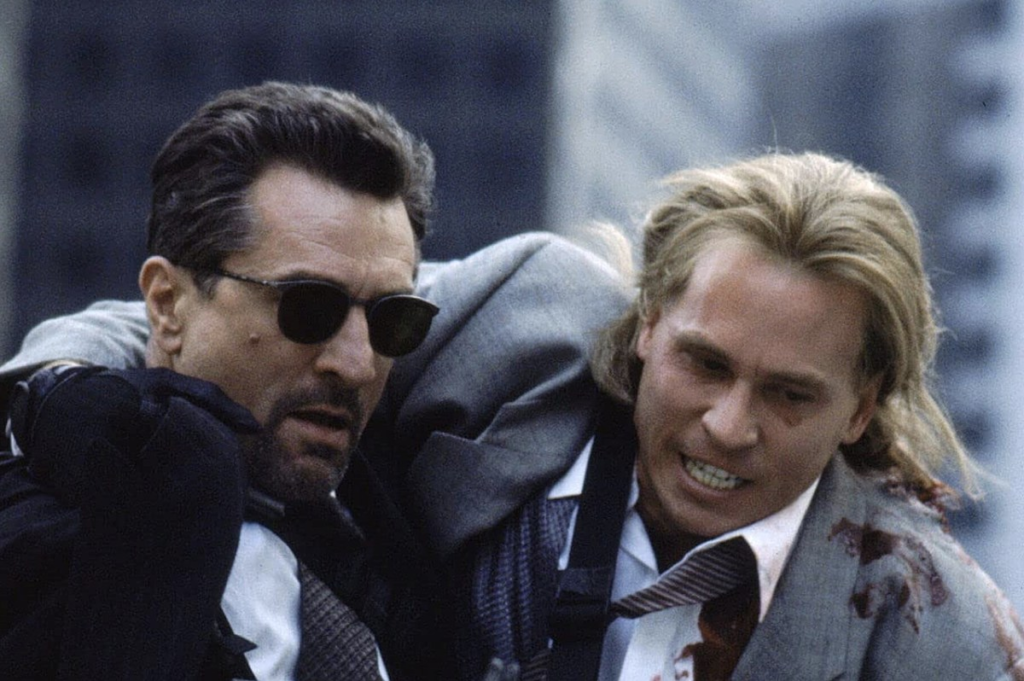
Heat sets itself apart from Mann’s early adaptations because it’s also an ambitious labyrinth of plot. Threaded through the thieves’ lives are the repercussions of the opening heist. We aren’t sure how he will fit into the story when he shows up, but the evil Waingro (Kevin Gage), takes full advantage of his chaotic disposition. He disrupts Team Neil’s dynamic during the first heist, throws more work at Vincent as he rapes and murders sex workers, and ultimately teams up with Van Zant to disrupt what is supposed to be Team Neil’s final score. Much like Waingro, we aren’t sure how Donald Breedan (Dennis Haysbert) fits into the tapestry until the last possible moment. Breedan especially is a tragic figure as a man released from prison, but put into an impenetrable box on the outside as the system fails him. He has no recourse against the cruel and corrupt restaurant manager (Bud Cort) who dangles parole violations in front of him to get him to work more for less. He does all he can to be lawful on the outside, but it doesn’t matter how much he wants to be better because he realizes, inside or outside, he’s not his own man. The heist is his last chance to take back his freedom. Heat is filled with dozens of characters, mostly men, who all have a certain amount of untapped depth to them.
That depth comes to a head when Vincent and Neil sit down for a cup of coffee in a very crowded coffee shop. It’s the film’s way of letting out the breath that it’s been holding. It’s a way of bringing the two halves of the story together in order to understand how it must end. Action films, crime films, films of law against chaos are predicated on the idea that their stories are good vs. evil. Heat is the challenge to that assumption. Heat also challenges the assumption that civility has no place amongst men, that one or either has to perform a subterfuge for them to go back and do what they do. These two opposites, foes, antagonists, don’t use this time to spit, rage, belittle, berate, or posture at one another. What they do is they simply talk. They pontificate on their situation, families, loves, and drives. They become two humans at a coffee shop who know each other, but have no real idea about what makes the other who he is. They even come away with the conclusion that it will be difficult, if it comes down to it, to put each other down. They see each other’s humanity and it doesn’t make either one weaker in his conviction, but it helps to renew their convictions that Vincent is going to uphold the law and Neil will break it. They are an unstoppable force and an immovable object, but each of them knows in the back of their minds that they could slip and they could lose. The scene is a master stroke not only in breaking the formula, but in breaking down the ideas of cops and robbers and how men at odds with each other can interact.
Heat, while having incredible action set pieces, is so much more indelible because of its characters. Even as they are slotted into archetypes, the characters often zig rather than zag. Their threads come together to tighten the plot into a supremely well thought out machine. The film’s reputation and moniker as a movie for men is a false nomenclature. People can see how this film is different in the subtleties of the masculine energy. Its intricacy and depth brings people in even amongst the mayhem and violence, which it doesn’t revel in, but sees as a part of this life. The men in Heat are so much more than “guy’s guys,” and Heat is much more than a men’s movie in spite of it nearly exclusively starring men.
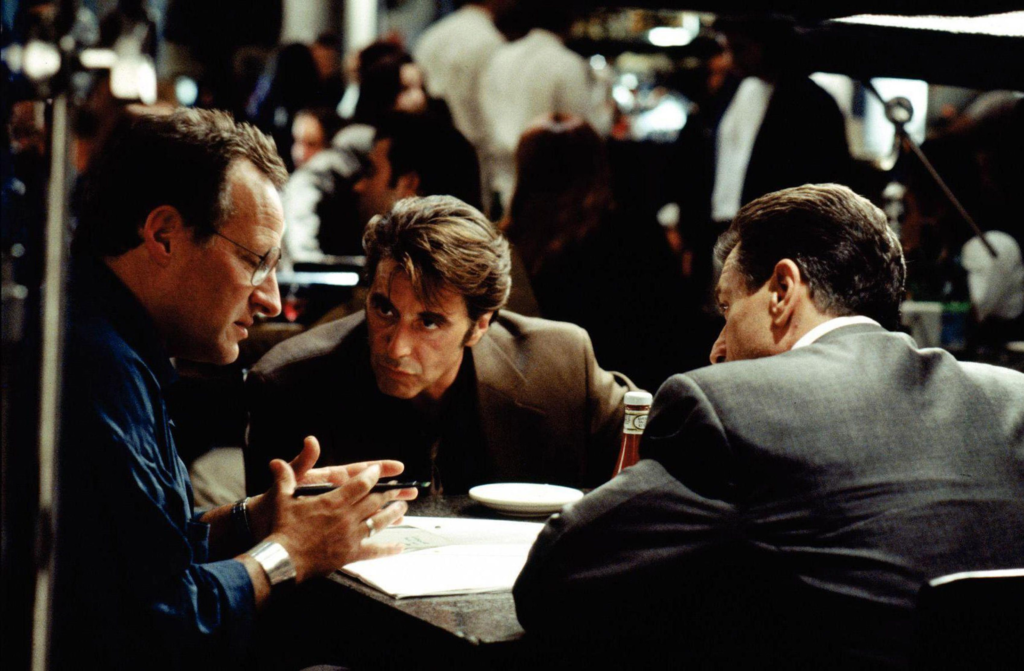
Michael Mann makes films about men. His men are masculine in a way that isn’t driven solely by testosterone. These men eschew many of the extremes of the societal constructs of what it means to be a man. They have brains and they have hearts and they use them in equal measure. They aren’t paragons or pinnacles of what men should be, but they’re close. They’re on the precipice of what we all would rather have than any experience of toxic masculinity. They represent the ideals of justice and a sort of creed when it comes to lawlessness. The duality of cops and robbers serves as a perfect breeding ground to explore masculine identity. The earlier films of Michael Mann, Thief and Manhunter, are clear lines to the foundations of Heat and the evolution of masculinity in the crime genre.





